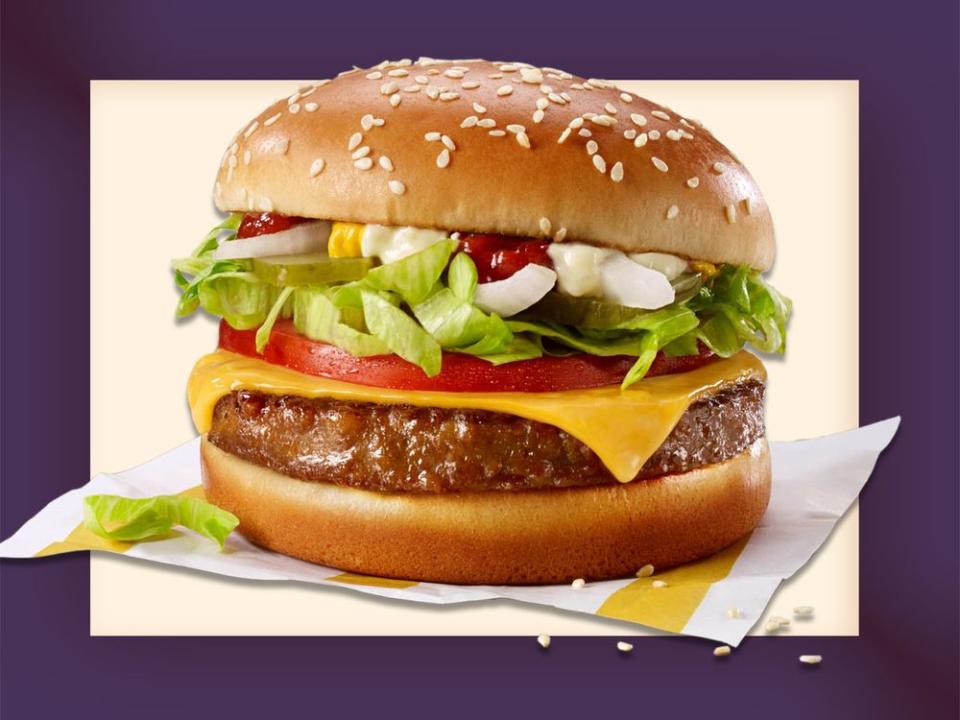McDonald's Expands Beyond Burger Test as Impossible Foods Backs Down
For the past several months, one of the biggest "Will they or won't they"-style speculations hasn't been about whether a particular celebrity couple will get married, or whether a royal pair will have another baby. Instead, there's been a lot of real-life and online contemplation about whether McDonald's will launch a plant-based burger in the United States.
The answer to that still seems to be the shrug emoji, but if the fast food giant does add a McPlant-something to its menu, the patties may not be made by Impossible Foods—at least not right now. In an interview with Reuters, the company's CEO says that it was no longer in talks with McDonald's, largely due to the sheer volume of Impossible Burgers that such a partnership would require.
"It would be stupid for us to be vying for them right now," Pat Brown said. "Having more big customers right now doesn’t do us any good until we scale up production."
Brown added that he "wished" the company could produce more of its Impossible patties right now, but that's just, you know, not possible. He did say that, instead of chasing another big client, Impossible Foods would instead be working to double its production capabilities.

McDonald's has roughly 14,000 restaurants in the United States. According to the Impossible Foods website, "the Impossible" is currently available in around 15,000 restaurants in the U.S., Hong Kong, Macau, and Singapore, including the more than 7,000 Burger King locations that serve the Impossible Whopper.
On Wednesday, McDonald's announced that it would be doubling the number of restaurants that are currently trialing its plant-based P.L.T. burger (yes, that stands for Plant, Lettuce, and Tomato) in Canada. By mid-January, the sandwich will be available at 52 restaurants in southwestern Ontario, and the test-run will continue for another three months.
The P.L.T., features a plant-based patty made by Impossible's biggest rival Beyond Meat, and both the recipe and the toppings will remain the same for the second phase of the trial. (In addition to the L. and the T., each sandwich is currently served with cheese, ketchup, mustard, mayonnaise, onion and pickles.)
"You don’t want to make any assumptions on a small group of people," Michaela Charette, the head of consumer insights at McDonald’s Canada, told the Financial Post. "So the expanded scope in the second phase of the test is really exciting for me."
Although McDonald's has not commented on sales figures, Swiss investment bank UBS estimated that the chain sold between 20 and 30 P.L.T. sandwiches a day during the first 12 weeks of its trial, although restaurants in more populated areas sold as many as 100 P.L.T.s per day.
In December, UBS told Reuters that those sales numbers suggested that McDonald's could sell more than 250 million P.L.T.s annually, if the burger were available in all of its U.S. locations.
"We believe Beyond Meat has a first-mover advantage—for now—but it appears a door remains open for McDonald’s to refine its P.L.T. offering before introducing a plant based patty in the United States," Steven Strycula, a USB analyst, said at the time. "Further, we do not know whether MCD plans to single-source or multi-source a U.S. menu item."
McDonald's hasn't revealed its plans for the P.L.T. going forward, but Impossible Foods would still like to be part of them...eventually. “When we are ready to do it, we would certainly like them to be a customer," Brown said.

